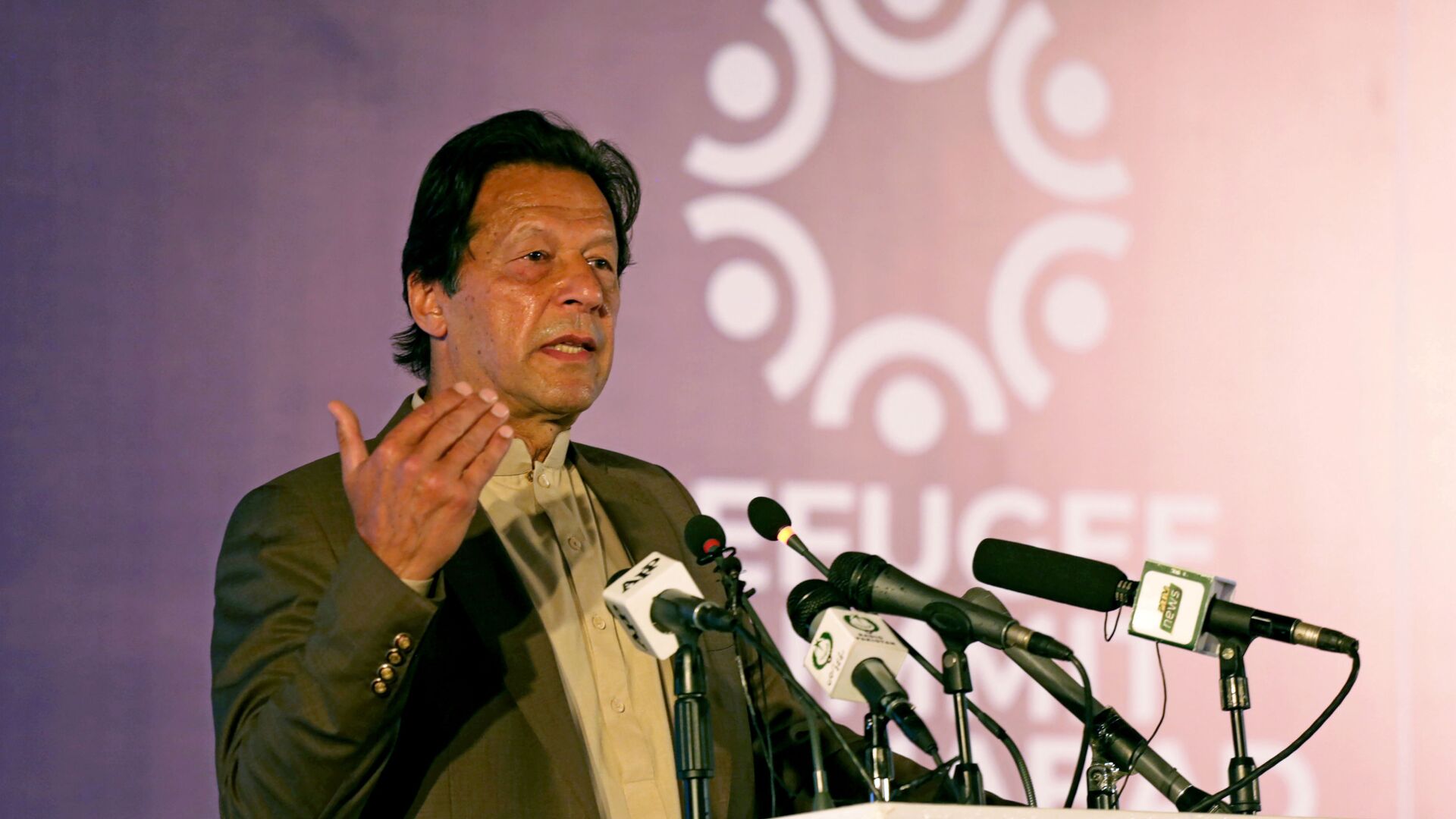https://sputnikglobe.com/20220114/pakistan-security-policy-lists-indian-hindutva-driven-politics-as-threat-1092258107.html
Pakistan Security Policy Lists Indian Hindutva-Driven Politics as Threat
Pakistan Security Policy Lists Indian Hindutva-Driven Politics as Threat
Sputnik International
On Friday, Pakistan's Prime Minister Imran Khan unveiled a non-classified version of the country's first-ever National Security Policy 2022-2026. The policy... 14.01.2022, Sputnik International
2022-01-14T21:07+0000
2022-01-14T21:07+0000
2022-08-06T14:40+0000
pakistan
imran khan
narendra modi
muslim
national security
genocide
kashmir
https://cdn1.img.sputnikglobe.com/img/107972/49/1079724944_0:166:3051:1882_1920x0_80_0_0_794df60a5e34b848d93db08eda495507.jpg
Pakistan's new national security policy has listed several developments in neigbouring India, including what it characterizes as a "rise in Hindutva-driven politics" as a threat to the nation.The 62-page document states that change in the nature of India's domestic politics is "deeply concerning," and it impacts Pakistan's immediate security.India's growing military capabilities combined with access to advanced technology and "exceptions in the non-proliferation rules" are also listed in the document as "a matter of concern for Pakistan"."Besides impacting regional stability, such policies of exceptionalism also undermine the global non-proliferation regime," the document underlines.Despite being a nuclear power, India is not a signatory to the 'Treaty on the Prohibition of Nuclear Weapons'. The Indian foreign ministry, in a statement earlier this year, claimed that the treaty does not constitute or contribute to the development of customary international law, further justifying the move as it does not set any new standards or norms.Pakistan's National Security Advisor Moeed Yusuf said that the policy places the control of the Jammu and Kashmir region as the core of the bilateral relationship. Khan has alleged that religious minorities in India have been "targeted with impunity" by Hindutva groups under the Narendra Modi government.A genocide call of 200 million Muslims by Hindu activists and religious leaders during an event in the northern Indian city of Haridwar last month attracted global attention and condemnation.United Nations Special Rapporteur on Minority Issues, Fernand de Varennes, on Wednesday condemned the harassment faced by Muslim women in India, demanding full and equal protection of all Human Rights of minorities in the country.
pakistan
kashmir
Sputnik International
feedback@sputniknews.com
+74956456601
MIA „Rossiya Segodnya“
2022
Rishikesh Kumar
https://cdn1.img.sputnikglobe.com/img/07e4/08/04/1080055820_0:0:388:389_100x100_80_0_0_40018ee210946d65d49ffba4f4c008e1.jpg
Rishikesh Kumar
https://cdn1.img.sputnikglobe.com/img/07e4/08/04/1080055820_0:0:388:389_100x100_80_0_0_40018ee210946d65d49ffba4f4c008e1.jpg
News
en_EN
Sputnik International
feedback@sputniknews.com
+74956456601
MIA „Rossiya Segodnya“
Sputnik International
feedback@sputniknews.com
+74956456601
MIA „Rossiya Segodnya“
Rishikesh Kumar
https://cdn1.img.sputnikglobe.com/img/07e4/08/04/1080055820_0:0:388:389_100x100_80_0_0_40018ee210946d65d49ffba4f4c008e1.jpg
pakistan, imran khan, narendra modi, muslim, national security, genocide, kashmir
pakistan, imran khan, narendra modi, muslim, national security, genocide, kashmir
Pakistan Security Policy Lists Indian Hindutva-Driven Politics as Threat
21:07 GMT 14.01.2022 (Updated: 14:40 GMT 06.08.2022) On Friday, Pakistan's Prime Minister Imran Khan unveiled a non-classified version of the country's first-ever National Security Policy 2022-2026. The policy document clarifies a multi-pronged approach, placing economic security at its core to ensure the stability of the nation.
Pakistan's new national security policy has listed several developments in neigbouring India, including what it characterizes as a "rise in Hindutva-driven politics" as a threat to the nation.
The 62-page document states that change in the nature of India's domestic politics is "deeply concerning," and it impacts Pakistan's immediate security.
"The political exploitation of a policy of belligerence towards Pakistan by India's leadership has led to the threat of military adventurism and non-contact warfare to our immediate east," according to the document.
India's growing military capabilities combined with access to advanced technology and "exceptions in the non-proliferation rules" are also listed in the document as "a matter of concern for Pakistan".
"Besides impacting regional stability, such policies of exceptionalism also undermine the
global non-proliferation regime," the document underlines.
Despite being a nuclear power, India is not a signatory to the 'Treaty on the Prohibition of Nuclear Weapons'. The Indian foreign ministry, in a statement earlier this year, claimed that the treaty does not constitute or contribute to the development of customary international law, further justifying the move as it does not set any new standards or norms.
Pakistan's National Security Advisor Moeed Yusuf said that the policy places the control of the Jammu and Kashmir region as the core of the bilateral relationship.
"It [policy] tells India to do the right thing and jump on the bandwagon to benefit from regional connectivity to uplift our peoples. It also tells India, if you don't want to do the right thing, it will be a loss to the entire region, but most of all India," Yusuf said.
Khan has alleged that religious minorities in India have been
"targeted with impunity" by Hindutva groups under the Narendra Modi government.
A
genocide call of 200 million Muslims by Hindu activists and religious leaders during an event in the northern Indian city of Haridwar last month attracted global attention and condemnation.
United Nations Special Rapporteur on Minority Issues, Fernand de Varennes, on Wednesday condemned the harassment faced by Muslim women in India, demanding full and equal protection of all Human Rights of minorities in the country.


